Young people start businesses from village 'resources'
(Baonghean.vn) - They, the young men, once left the village to go to the city. Their love for their homeland urged them to return, start a business with the typical products of their hometown, nurture their dream of starting a business from the "resources" of the village, and tell the story of their village to everyone...
"Lotus dream" in Sen village
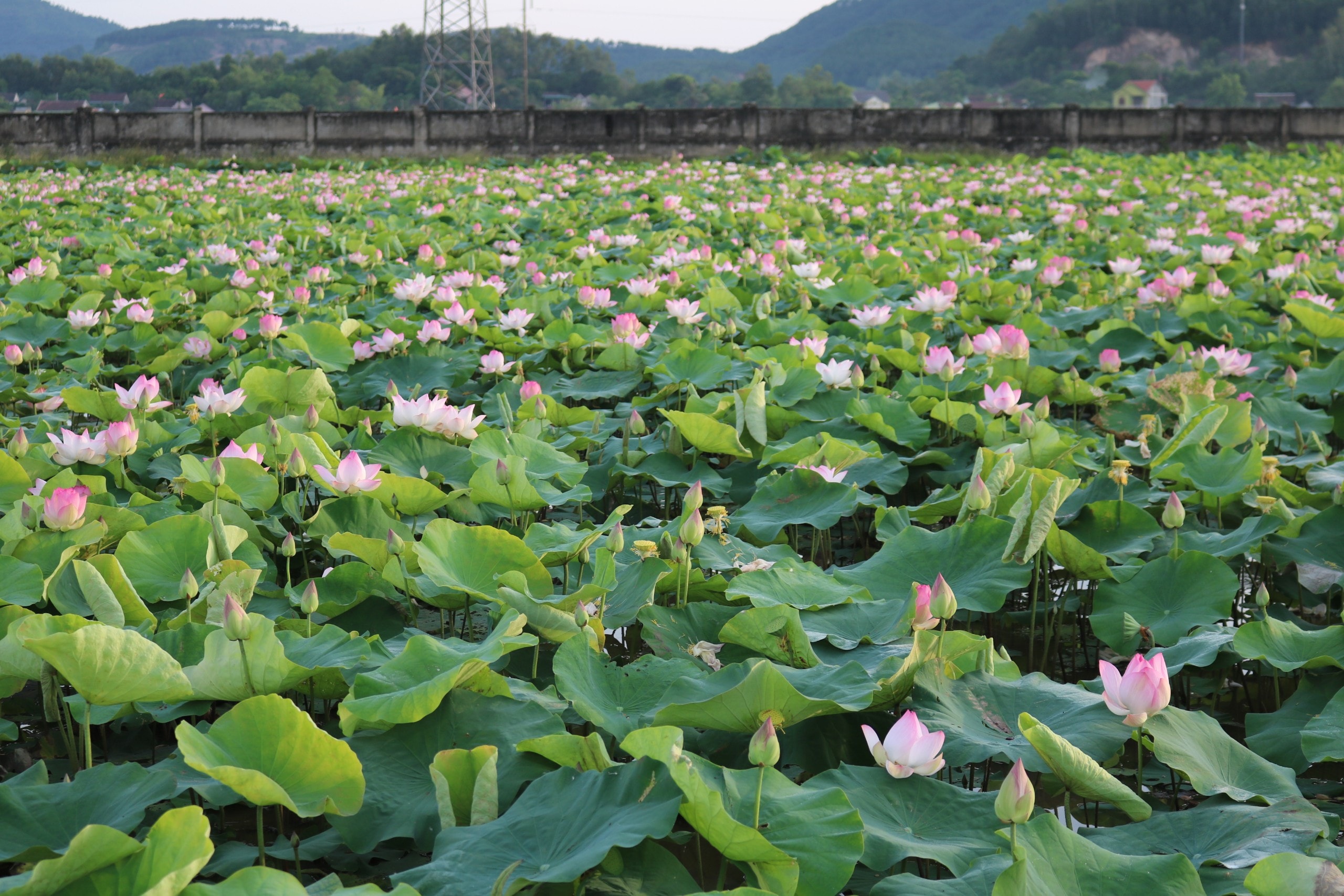 |
Sen Village is now fragrant with lotus scent. Photo: Thanh Phuc |
Sen Village, Kim Lien Commune (Nam Dan) has become a familiar place name to any Vietnamese people, because it is Uncle Ho's hometown - the common hometown. For generations, the village's name has been associated with fragrant lotus ponds surrounding the village. However, the village has gradually become concreted, many lotus ponds have been filled into residential land, leaving only a few scattered small lotus ponds, with naturally growing, stunted lotus plants.
“A Sen village without lotus. Kim Lien without the scent of lotus”, many people, when coming to Uncle Ho’s hometown, share the same feeling, the same regret. And while those lotus ponds are gradually disappearing, the Sen village is also lacking its soul, at the right time, the young man Pham Kim Tien, a master of agriculture, after an incident, “left the city to return to the countryside” to realize his dream with the lotus tree of Uncle Ho’s hometown...
 |
| Young man Pham Kim Tien has realized his lotus dream in Sen village. Photo: NVCC |
“Born in Sen village, growing up next to vast lotus fields, living in the fragrant scent of lotus, I have a special love for this flower. Returning to my hometown, in addition to doing business, I spend time taking care of and collecting lotus varieties, learning about the biological characteristics and different products from lotus. My dream is to restore lotus ponds, cover ponds, lakes, and swamps in the village with lotus varieties to create a landscape for tourists to enjoy when visiting Uncle Ho's hometown. At the same time, change the habit of growing lotus on a small scale, bringing livelihoods to people from growing and processing lotus products,” Pham Kim Tien confided.
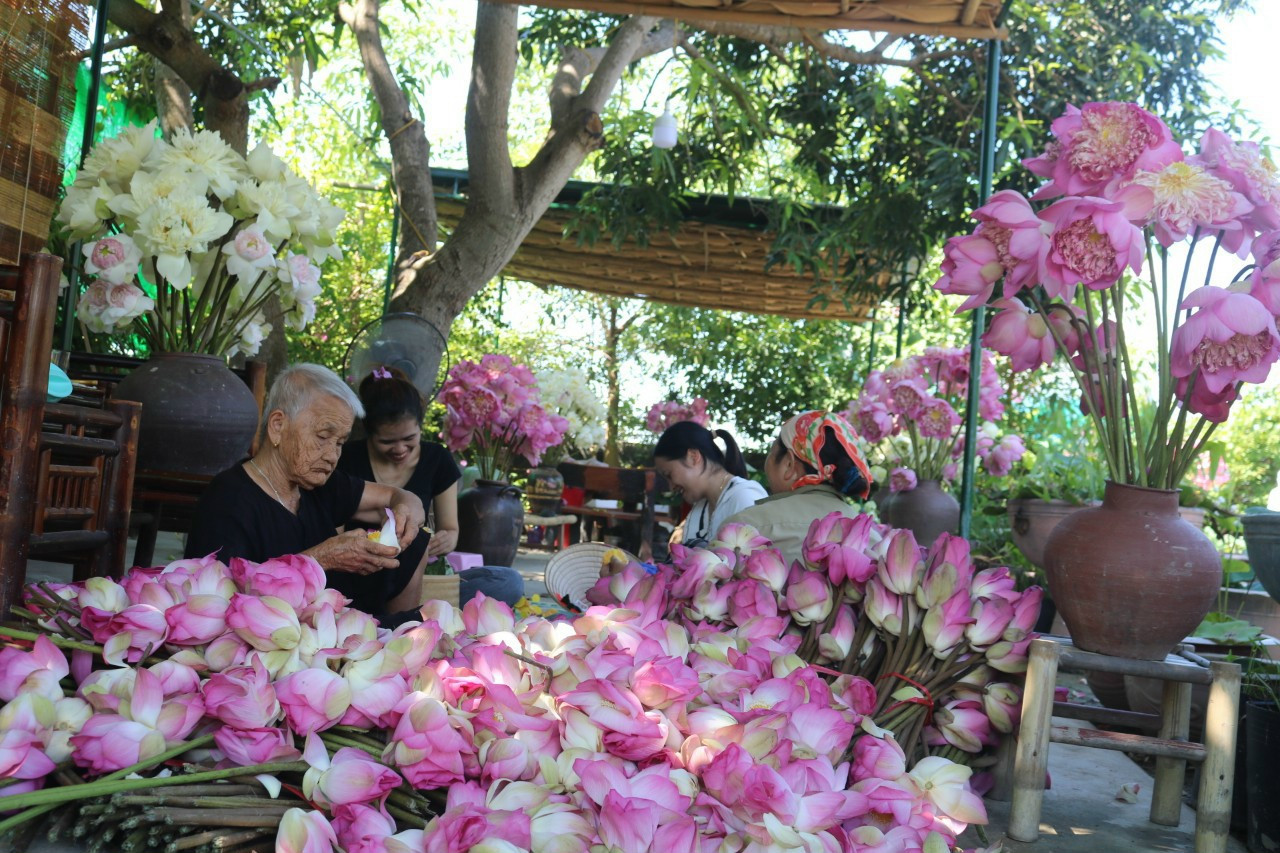 |
Sen villagers process products extracted from lotus flowers. Photo: Thanh Phuc |
And then, with nearly 200 million VND that the young couple had saved for years, Tien invested in lotus. Bidding for deep ponds and fallow fields of the commune; improving the land, buying lotus seeds of all kinds, hiring workers to plant them on a trial basis. At first, many people were skeptical about Tien's idea, wondering if lotus from Thailand, China, Japan... would be suitable for swampy fields and fallow fields? And if it lived, bloomed, had mirrors, seeds, shoots, and tubers, who would they sell it to? Would those hundreds of millions of VND turn to mud with the lotus?...
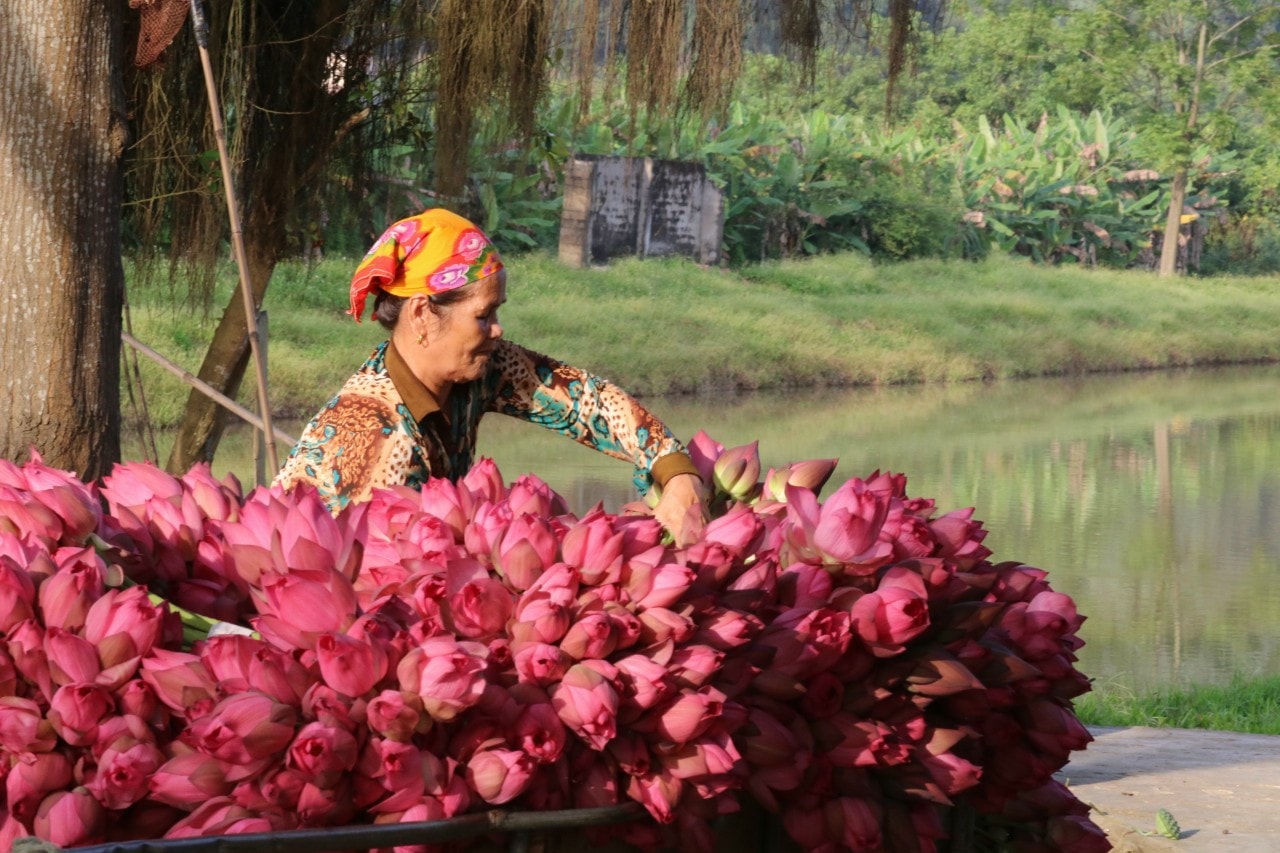 |
| Young man Pham Kim Tien has created jobs and stable income for people in Kim Lien commune (Nam Dan). Photo: CSCC |
Overcoming those doubts, step by step, Tien silently and determinedly persevered in the direction he had outlined. Lotus ponds with hundreds of lotus varieties competing to show off their colors: white lotus, pink Super lotus, yellow Thai lotus, red Beijing lotus, thousand-petal lotus... "Each type of lotus has its own advantages, disadvantages, and uses. There are varieties that we grow to harvest flowers, there are varieties for harvesting tubers, there are varieties for tea infusion, making tea... Therefore, to make lotus a commodity, we must expand the planting area associated with processing lotus products," Tien shared.
To expand the lotus growing area, in addition to persuading people to convert flooded, ineffective fields to lotus growing, Tien also supports lotus seeds, guides planting techniques and commits to purchasing products for people. In 2019, Tien boldly established the Bac Que Sen Cooperative, which not only grows and supplies lotus seeds and lotus flowers but also deeply processes lotus products such as: Lotus tea (lotus-scented tea, lotus leaf tea, Lien Tu tea, Bach Lien Nu Vuong tea...), seed products (fresh lotus seeds, dried lotus seeds, lotus seed milk; lotus kimchi, salted lotus root; making lotus incense...).
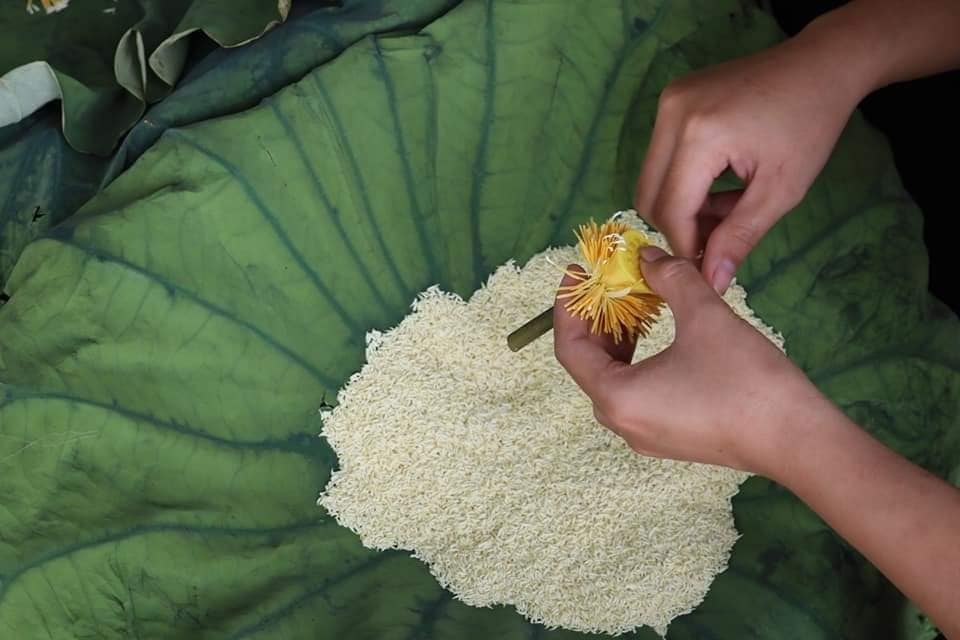 |
Separating lotus seeds to make tea. Photo: Thanh Phuc |
“Start-up products in Uncle Ho’s hometown have their own advantages when they are cared for and facilitated by the authorities from local to district and provincial levels. In particular, the number of tourists visiting Uncle Ho’s hometown every year reaches several million; deeply processed lotus products are very suitable as gifts for tourists when coming to Sen village. This is also a “special product” of Nghe An, suitable for units, agencies and businesses to give as gifts to relatives, friends and partners. Therefore, the market potential for lotus products is very open,” Tien said.
To turn potential into reality, Tien invested in machinery, production lines, diversified products, invested in packaging design, and labels to enhance the value of lotus products. Currently, the Cooperative has 17 members, expanding the lotus growing scale to 100 hectares with more than 100 varieties; has 15 deeply processed products from lotus, of which 11 products are recognized as 3-4 OCOP stars. Currently, products from Sen Que Bac Cooperative are present in all markets in the South and the North; on supermarket shelves; and are chosen by many units, agencies, and businesses as gifts.
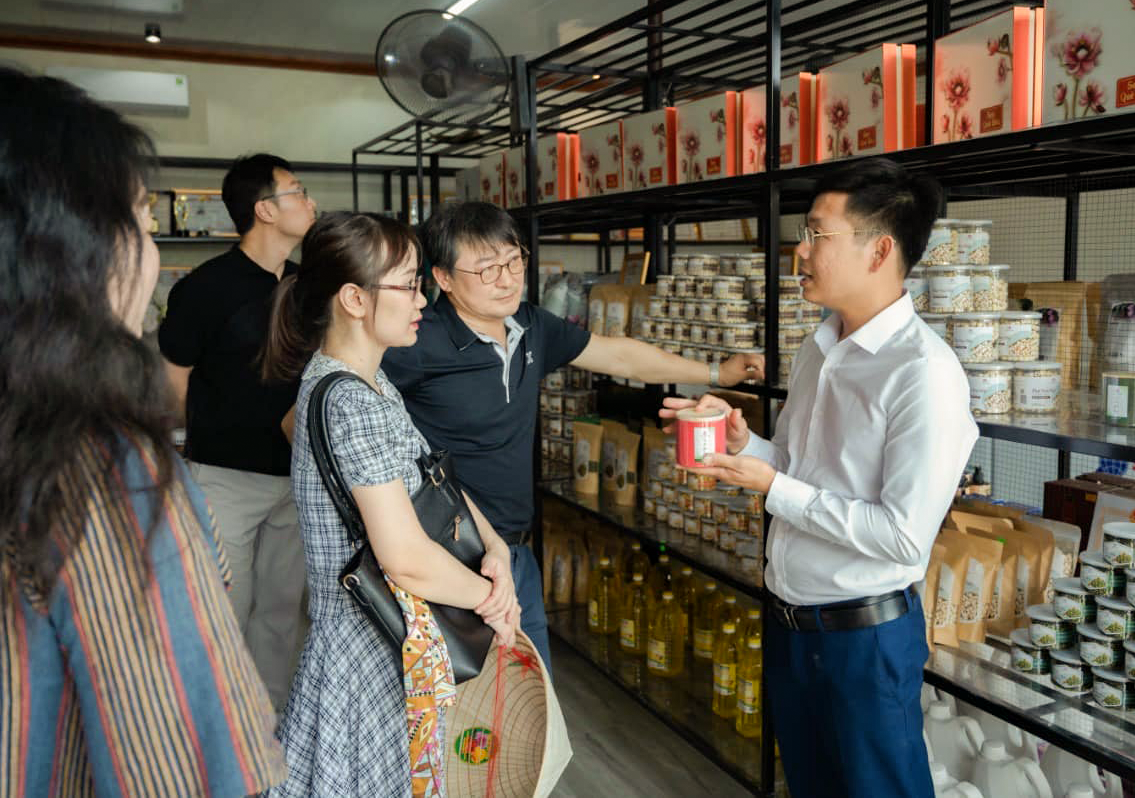 |
Pham Kim Tien introduces lotus products to tourists. Photo: Thanh Phuc |
“The most proud thing is that the lotus products from Uncle Ho’s hometown have become a unique identity, a typical product of Uncle Ho’s hometown that is favored by tourists, and have become diplomatic gifts at conferences, during holidays and Tet. The lotus tea boxes, lotus jam, and lotus cake contain the full value, flavor and soul of Uncle Ho’s hometown, containing pride, the soul of his hometown...”, Tien proudly said.
For the people of Sen village, in the village story today, there is an additional story about a young man who "left the city to return to the village", realizing the "lotus dream", so that the village is now truly fragrant with lotus scent, brilliant with lotus flowers, true to the village's name.
Bringing rice paper from Luong to the West
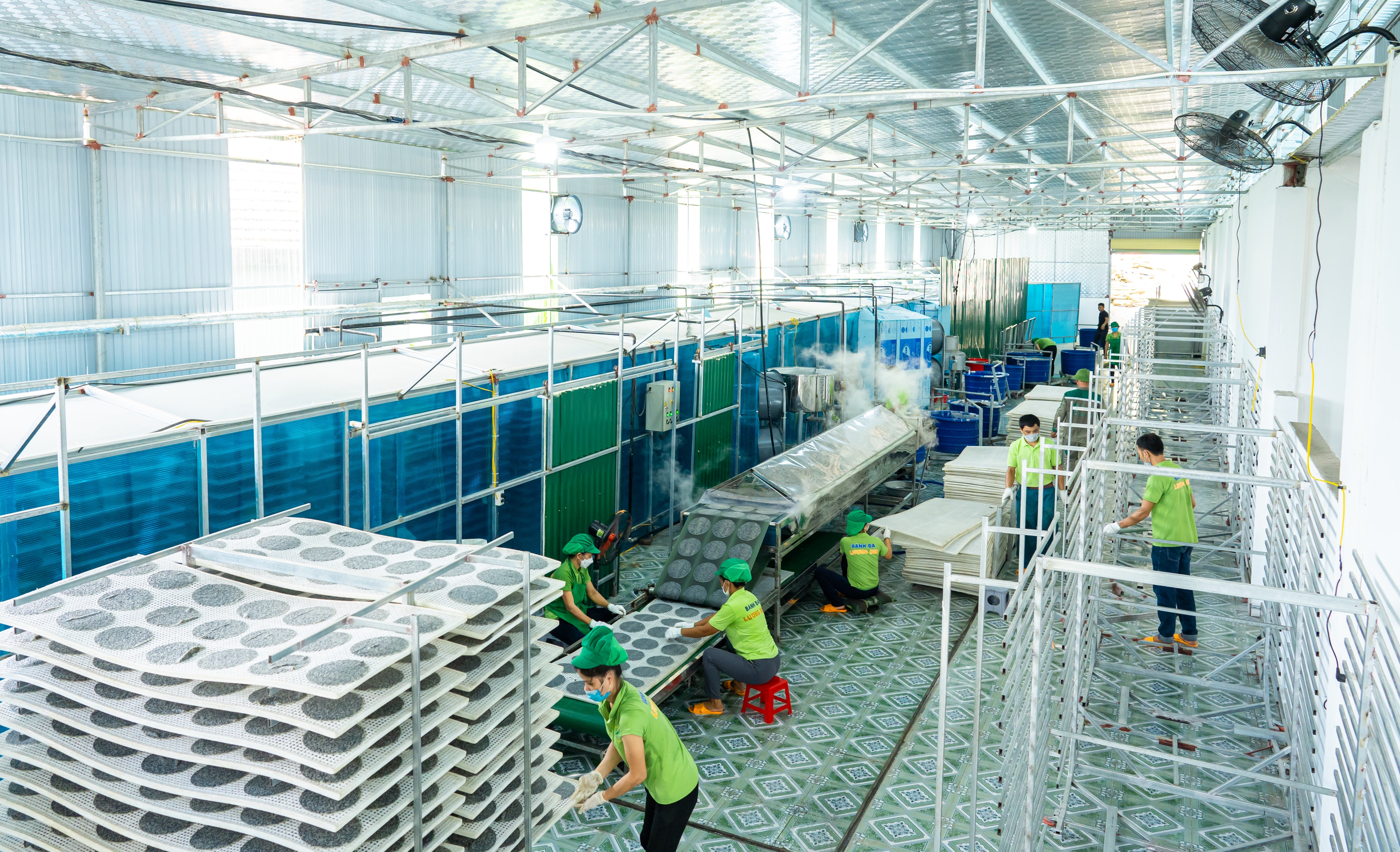 |
Rice paper making workshop of two young men from Luong (Do Luong). Photo: Thanh Phuc |
Born and raised in Do Luong, after graduating from university with a major in Construction, two engineers Nguyen Ngoc Phuong (Quang Son commune) and Nguyen Ba Thang (Nhan Son commune) were both engrossed in projects in the South and the North... In the situation of "here today, there tomorrow", living far away from their wives and children, one day two young people from the same hometown, schoolmates and also colleagues wished to return to their hometown to live with their families.
But, what to do to make a living when they return to their hometown? After many discussions and exchanges, the two decided to return and take up their fathers' traditional profession of making rice paper to start a business. At first, they faced strong reactions from their families and relatives. "The family strongly opposed, saying that they should send their children to school to escape the bamboo fence of the village, go out and have a job, have an income, not have to bend their backs by the fire, run from the rain, run from the sun, and work hard to sell each rice paper in exchange for daily meals. Yet, now they quit their government job with a monthly income of tens of millions of dong to come home to make rice paper!...", Phuong recounted.
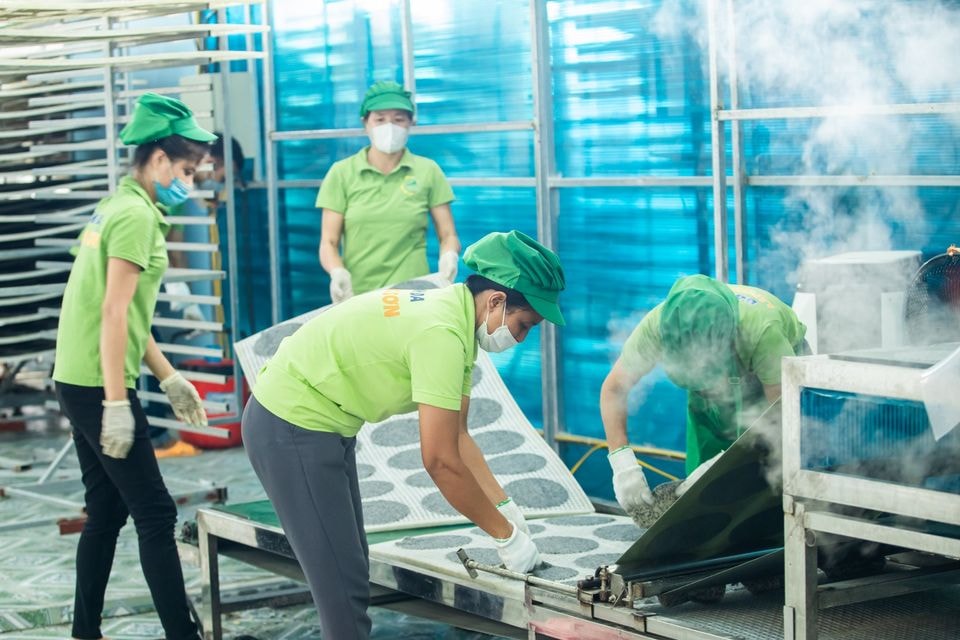 |
Coating cakes with modern production line. Photo: Thanh Phuc |
But for Phuong and Thang, it was a mature, well-thought-out decision, and they had outlined a long-term strategy. “Rice paper is a specialty of my hometown, Do Luong has a hundred-year-old rice paper craft village. Rice paper is always a gift, a source of pride for every Luong resident to their friends. However, I have witnessed my villagers working hard in the fields, making rice and sesame seeds; then grinding flour, sweating to make each cake, and drying it. Then they themselves have to carry the cakes to the market, fan them, and sell them retail to customers everywhere. And if it stops there, rice paper will only be a traditional profession,” Nguyen Ba Thang confided.
In 2017, the two decided to return to start a business with sesame rice paper - a childhood gift and a specialty of their hometown in Luong. Instead of building a clay oven and buying firewood to make rice paper, Phuong and Thang borrowed land, opened a factory, hired mechanics to design a rice paper production line. Do Luong people began to be curious, and were "convinced" by the modern rice paper production line, with the stages of grinding flour, mixing flour, and making rice paper all automated by machines. From that factory, every day, large trucks came to "buy goods", and sesame rice paper was packed into bags, boxes, and crates for distribution throughout the country.
 |
| Rice paper - a specialty of Luong land has been exported to Japan, Taiwan, Korea and soon to European countries. Photo: Thanh Phuc |
“We divided the work, one person was in charge of production, one person was in charge of the market. The production person was in charge of making sure the input materials were standard; processing them to have the right taste of Luong rice paper; and packaging them beautifully. The marketing person was in charge of surveying the needs and tastes of customers; building a network of collaborators and agents, connecting to be present at booths and supermarkets; participating in product promotion... For the first 2 years, both of us worked hard, without any time to rest. Because once we did it, we had put in so much capital and effort, we had to do it to the end, if we stopped, it would mean defeat, bankruptcy,” Phuong shared.
And success came from the relentless efforts of the young couple. Orders from Binh Duong, Ho Chi Minh City, Bien Hoa, Dong Nai to Hanoi, Hai Phong came in droves, the products were sold as soon as they were made. In particular, in 2020, Luong Son rice paper was recognized as a "3-star" OCOP provincial level as a "passport" to help the product reach further to all regions of the country. There were times when the production of rice paper was not enough to supply the market.
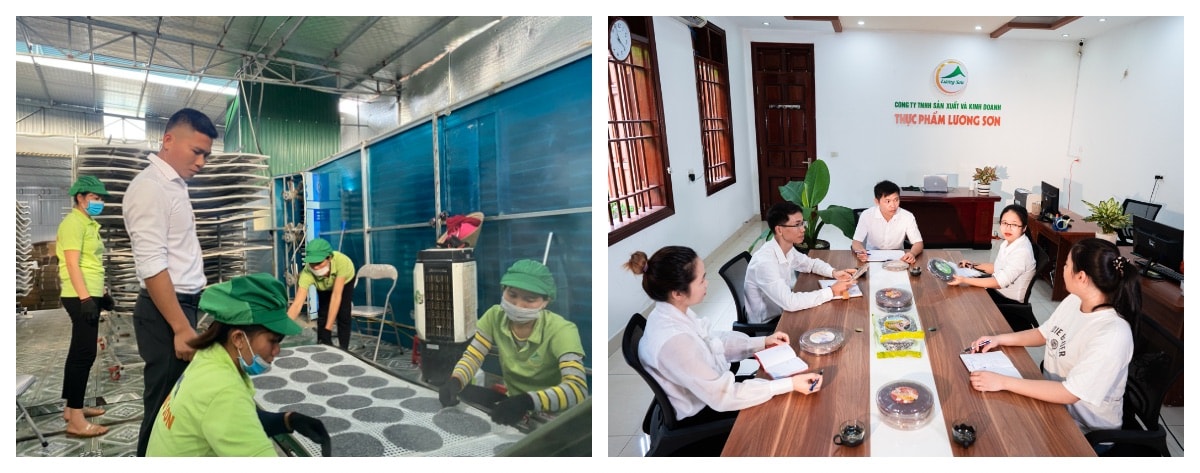 |
Nguyen Ba Thang (left cover) and Nguyen Ngoc Phuong (white shirt, sitting in the middle, right cover) - Two young men starting a business from their hometown's specialties. Photo: Thanh Phuc |
In 2020, the first successful export order to Japan motivated Luong Son Food Production and Trading Company Limited to expand production and target the export market. Nguyen Ngoc Phuong added: “Nghe An people are everywhere. The longer they are away from home, the more successful they are, the more they miss their homeland, the more they want to enjoy the taste of their homeland. They are the bridge for Luong Son rice paper to be present in many places around the world.”
In 2022, the factory was expanded in scale, putting into use closed-loop drying technology with a total investment of 4 billion VND, a maximum capacity of nearly 40 million cakes/year, creating jobs for more than 50 local workers. "If before, rice paper had to be dried in the sun, depending on the weather, so sometimes it was too crispy, sometimes it was moldy, but with closed-loop drying technology, the raw materials were carefully selected beforehand, so the quality is always guaranteed to keep the "full flavor" of the specialty rice paper of Luong land", Thang shared.
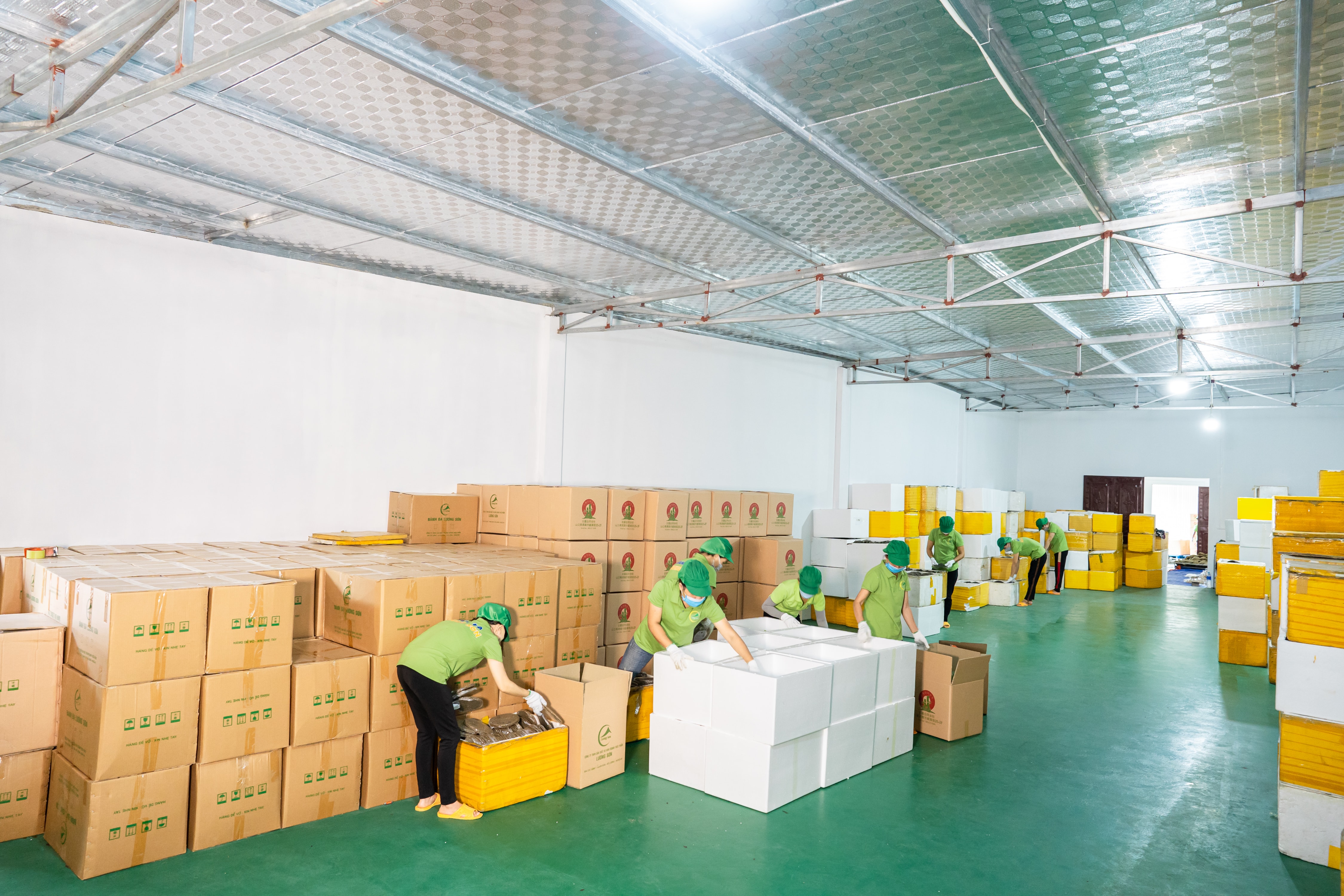 |
Packing rice paper for export. Photo: Thanh Phuc |
Currently, Luong Son rice paper has "covered" the whole country with nearly 600 agents and collaborators; in particular, in 2022, 1 million cakes were exported to a number of countries such as Japan, Korea, Taiwan, Australia, etc. In addition to traditional sesame rice paper, there is now also a premium brown rice rice paper line. "In addition to revenue and profit, what makes us most proud is bringing our hometown specialty - the fragrant rice paper of the land of Luong to friends all over the world", Nguyen Ngoc Phuong proudly said.
Creating new value for Tra Lan bamboo
Con Cuong land - Tra Lan region is associated with bamboo trees, bamboo trees once appeared in Nguyen Trai's "Binh Ngo Dai Cao": "Tra Lan region, bamboo splits and ash flies". Bamboo is a native crop, the livelihood of thousands of people living on the forest and is also the "village soul" of this countryside. Born and raised in Khe Choang, Chau Khe commune, Thai Dang Tien, like many other local boys, spent his whole life attached to bamboo trees, having enough to eat, warm clothes, and going to school thanks to the money from exploiting and selling bamboo from his parents.
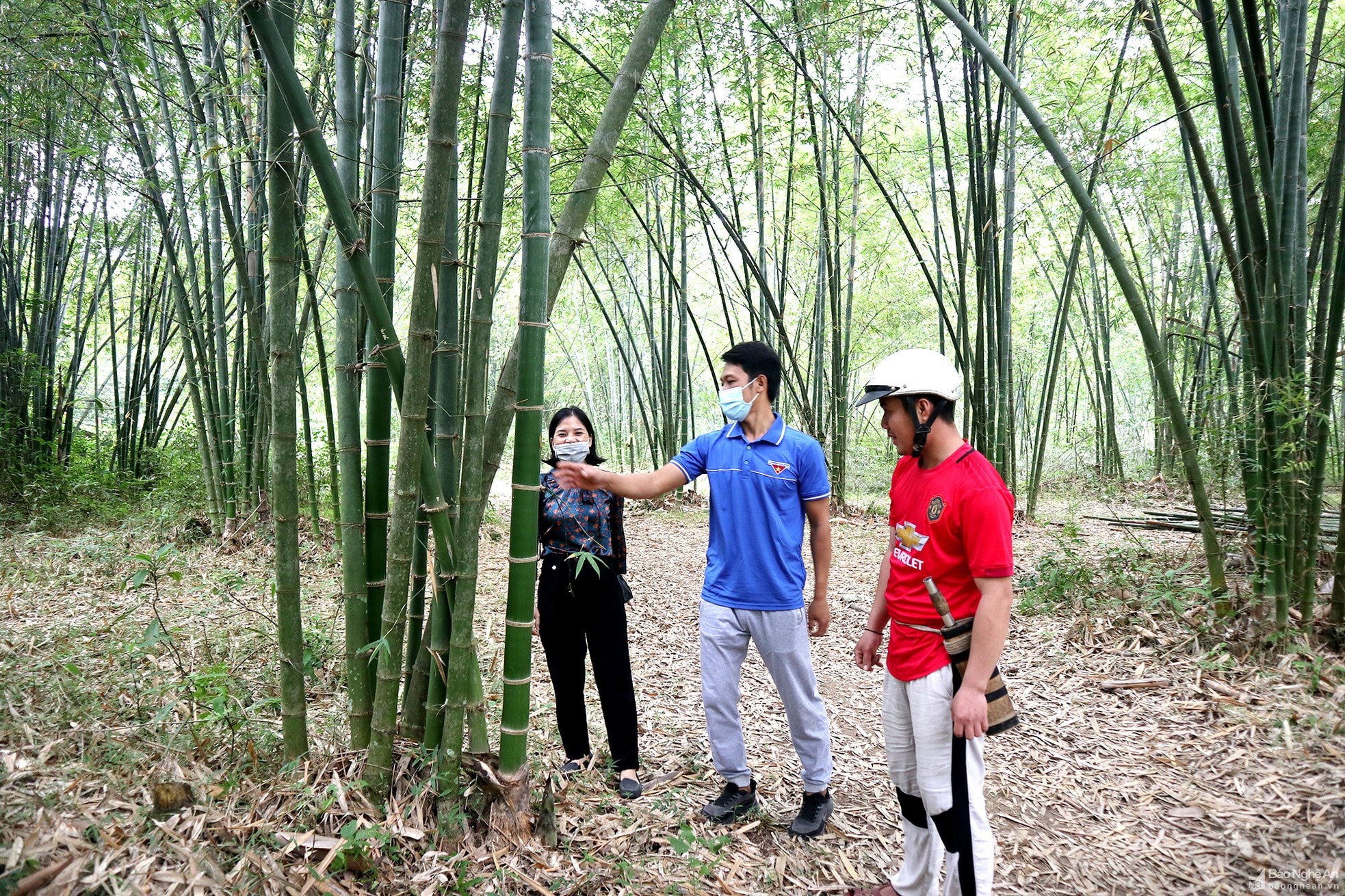 |
| Thai Dang Tien - the person who creates new value for Tra Lan bamboo. Photo: Thanh Phuc |
After finishing high school, going to the city to learn a trade and working abroad in Taiwan for many years, the image of the green bamboo forest always lingered in Tien's homesickness. For three years in Taiwan, working in bamboo processing factories, Tien nurtured many ideas and cherished many dreams. "From rough bamboo trunks and bamboo stumps, they produced sophisticated handicrafts with economic value hundreds of times higher, which were favored by consumers. Meanwhile, in my hometown, people toiled to cut down entire bamboo forests, meters to sell, but the selling price was not much, people were still poor when living on a land of invaluable resources. They could do it, why can't we?", Thai Dang Tien shared.
After his labor export period expired, Tien returned to his hometown and gradually realized his idea. With the capital he had spent years working abroad, Tien invested it into opening a bamboo handicraft workshop, traveling to learn experiences everywhere to create products. From thorny, rough bamboo trees, through the talented hands of craftsmen, emerged sophisticated flower vases, tea pots, cups, water bottles, household items... with high aesthetics and great usefulness.
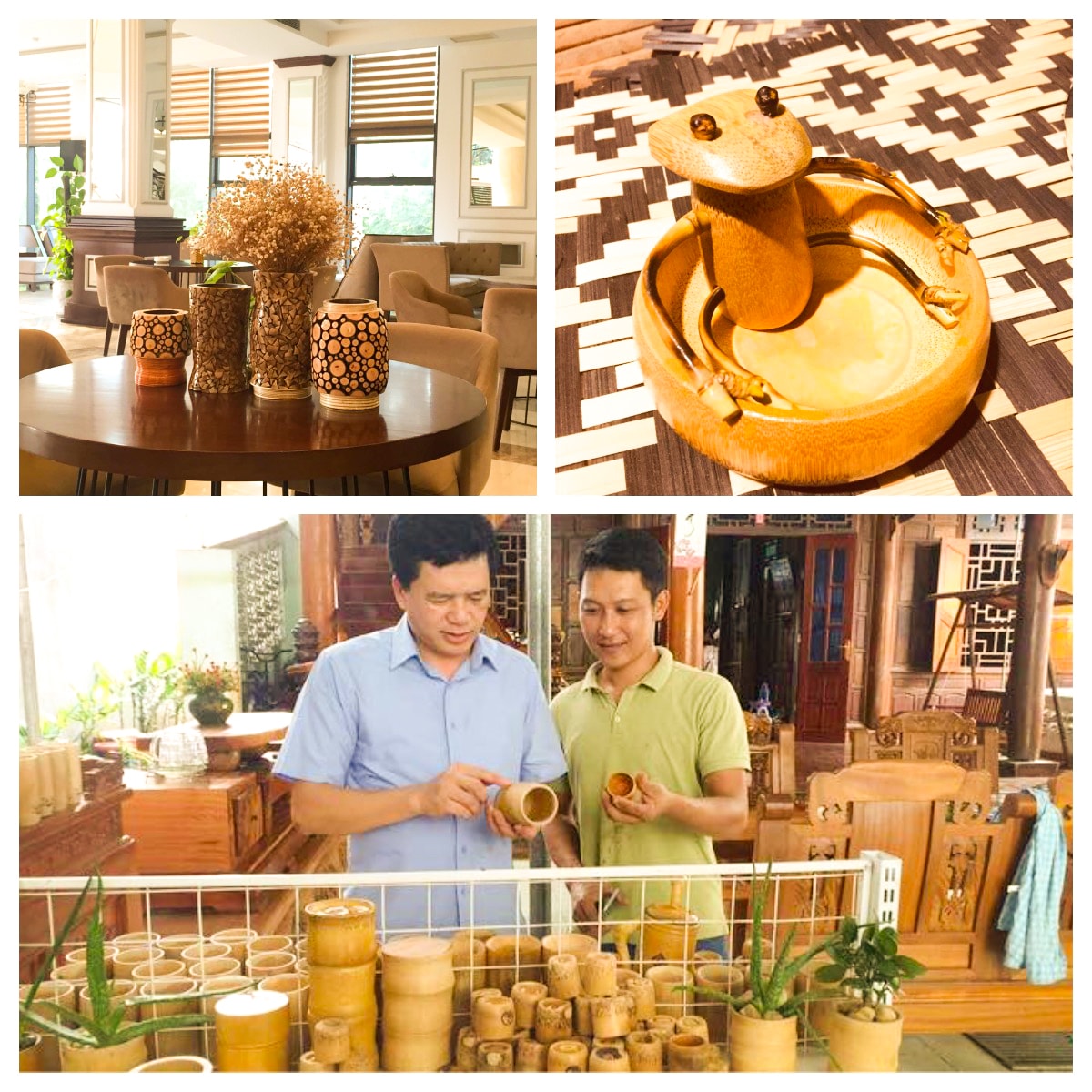 |
Artistic products from Tra Lan bamboo. Photo: Thanh Phuc |
The products under the brand name “Tra Lan Bamboo” that are available on the market and well received by consumers are the driving force for Thai Dang Tien to go further with the determination to bring new value to Tra Lan bamboo. Currently, in addition to handicraft products and household items made from bamboo, Tien’s workshop also accepts orders for interior decoration made from bamboo, making teaching aids and toys from bamboo, and the goal that Tien is aiming for is to export bamboo products under the brand name “Tra Lan Bamboo”.
Tien said: “The market for bamboo products has great potential as countries around the world are moving towards green consumption. My dream is that Tra Lan bamboo products will be present in every Vietnamese family; be used as furniture in community tourism areas; be an indispensable souvenir for everyone when coming to Nghe An. And further, export to modern European markets, or conquer demanding markets like Japan…
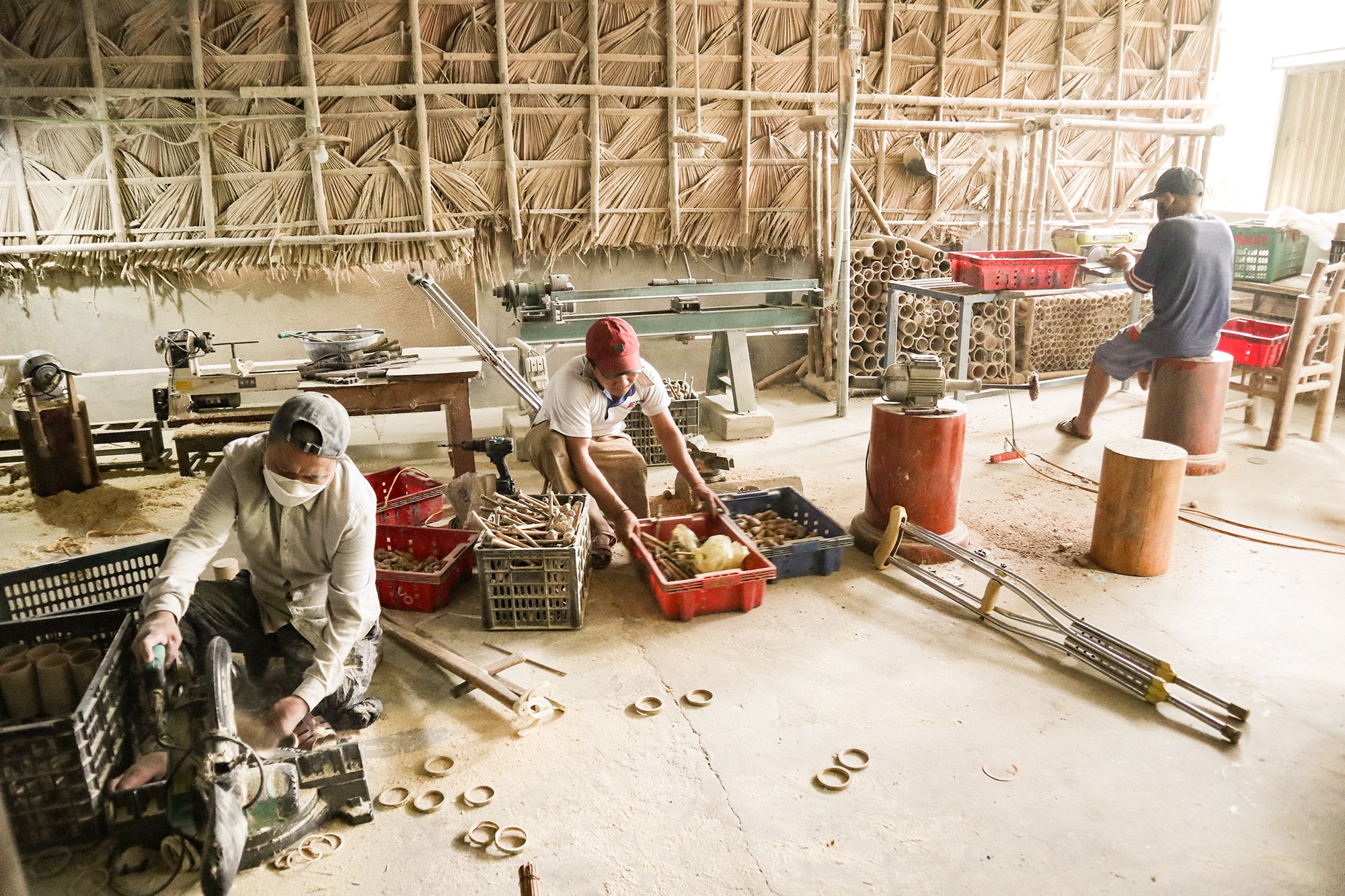 |
The workshop creates jobs for disadvantaged people in the locality. Photo: Thanh Phuc |
First of all, it is to bring economic value to bamboo, increase income for the villagers, and create jobs for local workers. Next, what I want is to promote the name of Tra Lan - Con Cuong, my hometown, to everywhere. Finally, it is to guide people to a green lifestyle and green consumption to protect the environment."
Currently, Thai Dang Tien has tested planting 2 hectares of new bamboo varieties, mobilizing people to develop bamboo material areas according to planning, taking care of and exploiting bamboo according to the process, not destroying it.

